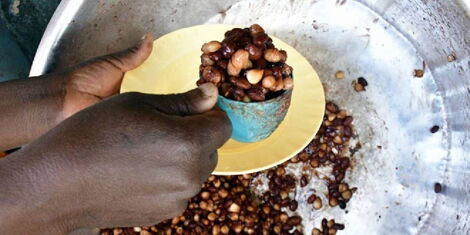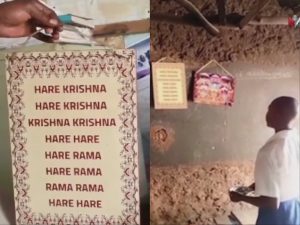News
Ugly Face of Donation: Devastation in Kilifi Schools Where Donors Forced Hindu Prayers For Githeri
Education officials suspended the programme after the video went viral, only to allow its continuation days later.

In the drought-stricken villages of Ganze, Kilifi County, desperation has created a troubling dynamic where hungry schoolchildren have become pawns in a religious controversy that has exposed the government’s failure to address basic educational needs.
What began as a lifeline for over 10,000 vulnerable learners across 17 schools has transformed into a debate about religious indoctrination after the International Society for Krishna Consciousness made Hindu prayers mandatory before meals.
The controversy erupted when a video surfaced showing children reciting the “Hare Krishna” mantra before eating their daily githeri rations.
The programme, which has operated since 2019 without conditions, took a dramatic turn during the August holidays when teachers were summoned to a Hindu temple in Nyali, Mombasa.
There, they received new instructions that prayers thanking Hindu gods must precede every meal, with teachers required to film the sessions for donors.
At Makonjemare Primary and Junior School, the harsh reality is evident.
More than 300 learners share their modest portions with younger siblings who trek to the school daily, highlighting the depth of poverty in these communities.
Parents, caught between religious concerns and starvation, have made their choice clear.
“I can’t let my children die of hunger when there’s free food,” said one mother of seven, speaking anonymously. Her sentiment echoes throughout the community where enrollment has surged purely because of the feeding programme.
The government’s response has been swift but arguably misguided.
Education officials suspended the programme after the video went viral, only to allow its continuation days later.
However, this knee-jerk reaction has exposed a more fundamental failure – the state’s inability to provide basic nutrition for its most vulnerable citizens.
Basic Education Principal Secretary Julius Bitok maintains the government will not accept indoctrination, yet critics argue the suspension punishes hungry children for adult failures.
The timing of emergency food deliveries from both national and county governments immediately after the controversy suggests these supplies were always available but never prioritized.
Anand Das, the society’s Mombasa chairperson, defends the prayer requirement as a universal practice of gratitude, comparing it to saying grace before meals.
However, he has threatened to withdraw stored food from all 17 schools unless the government apologizes for “soiling” the organization’s reputation.
The controversy has divided local leadership.
Ganze MP Kenneth Kazungu criticizes the government’s hasty action, while nutrition specialist Grace Mwasho warns that suspending food aid risks undermining children’s rights more than protecting them.
Perhaps most damning is the revelation that this crisis was entirely preventable.
For decades, these communities have relied on external donors while government resources remained unutilized.
The swift delivery of relief supplies after public outcry demonstrates that food was available but required a scandal to mobilize official action.
The International Society for Krishna Consciousness has pledged reforms, promising government oversight in future programmes.
However, the damage extends beyond religious sensitivities to expose systemic neglect of Kenya’s most vulnerable children.
As investigations continue, the fundamental question remains unanswered: why must children’s hunger be leveraged for religious conversion when the state possesses resources to feed them?
The devastation in Kilifi extends beyond empty stomachs to a broken system that abandons its responsibilities until external forces fill the void, often with strings attached.
The society’s global Food for Life programme claims to serve millions daily without conditions, yet the Kilifi experience suggests otherwise.
As stored food sits unused in school warehouses pending resolution, hungry children pay the price for adult failures and religious politics.
This controversy should serve as a wake-up call about the true cost of government neglect and the dangerous vacuum it creates for manipulation of Kenya’s most vulnerable citizens.
Kenya Insights allows guest blogging, if you want to be published on Kenya’s most authoritative and accurate blog, have an expose, news TIPS, story angles, human interest stories, drop us an email on [email protected] or via Telegram
-

 Grapevine2 weeks ago
Grapevine2 weeks agoAlleged Male Lover Claims His Life Is in Danger, Leaks Screenshots and Private Videos Linking SportPesa CEO Ronald Karauri
-

 Grapevine1 week ago
Grapevine1 week agoRussian Man’s Secret Sex Recordings Ignite Fury as Questions Mount Over Consent and Easy Pick-Ups in Nairobi
-

 Investigations5 days ago
Investigations5 days agoMulti-Million Dollar Fraud: Three Kenyans Face US Extradition in Massive Cybercrime Conspiracy
-

 Economy4 days ago
Economy4 days agoIran Demands Arrest, Prosecution Of Kenya’s Cup of Joe Director Director Over Sh2.6 Billion Tea Fraud
-

 Investigations2 weeks ago
Investigations2 weeks agoEpstein’s Girlfriend Ghislaine Maxwell Frequently Visited Kenya As Files Reveal Local Secret Links With The Underage Sex Trafficking Ring
-

 News3 days ago
News3 days agoTHE FIRM IN THE DOCK: How Kaplan and Stratton Became the Most Scrutinised Law Firm in Kenya
-

 Business4 days ago
Business4 days agoA Farm in Kenya’s Rift Valley Ignites a National Reckoning With Israeli Investment
-

 Business2 weeks ago
Business2 weeks agoM-Gas Pursues Carbon Credit Billions as Koko Networks Wreckage Exposes Market’s Dark Underbelly

















